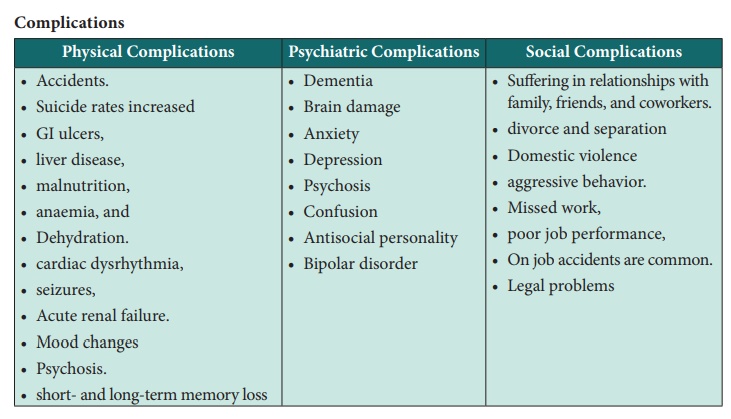Types, Causes - Drug Abuse, Alcohol Abuse and De-Addiction | 12th Nursing : Chapter 10 : Mental Health Nursing
Chapter: 12th Nursing : Chapter 10 : Mental Health Nursing
Drug Abuse, Alcohol Abuse and De-Addiction
Drug Abuse, Alcohol Abuse and De-Addiction
1.ã Drug Abuse
Drugs are a pervasive part of our society. Certain mood altering
substances are quite socially acceptable and are used moderately. They include
alcohol, caffeine, and nicotine. A wide variety of substances are produced for
medicinal Purposes. On the other hand, the dangerous effects of other illegal
substances have been well documented.
ãAt the bottom of every personãs dependency, there is always pain.
Discovering the pain and healing is an essential step in ending dependencyã.
Definition for Abuse: To use wrongfully or in a harmful way.
(APA-2000)
Types
ôñ
Alcohol
ôñ
Amphetamines and related
substances
ôñ
Caffeine
ôñ
Cannabis
ôñ
Cocaine
ôñ
Hallucinogens
ôñ
Inhalants
ôñ
Nicotine
ôñ
Opioids
ôñ
Phencyclidine (PCP) and
related substances
ôñ
Sedatives, hypnotics, or
anxiolytics
Causes
ôñ
Genetic
Factors
ôñ
Biochemical
Factors: Alterations
in neurotransmitters
ôñ
Psychological:
curiosity, escape from
reality, personality, life style and self-medication
ôñ
Social:
peer pressure, easy
availability, Culture, media, and popularity of drugs
Management of drug abuse
Care for a substance using patient starts with an assessment
during the phase of drug intoxication and detoxification
ôñ
Vital signs
ôñ
Intra Venous Fluid (IVF)
ôñ
Medication
ôñ
Rehabilitation
2. Alcohol Abuse
Alcohol abuse can steal the best years of your life. Alcohol does
not kill the addict. It kills the family, kids and people who tried to help.
Alcohol abuse is temporary fun with permanent consequences.
The word ãalcoholismã was first coined by ãMagnus Hussã. It was
derived from Arabic word ãalkuhlã, means ãessenceã.
Definition
ãAlcoholism is defined as a chronic diseases manifested by
repeated drinking that produces injuries to the drinkerãs health or to his
social or economic functioningã - S. Nambi
Epidemiology
The World Health Organization estimates about 140 million people
throughout world
Incidence ã - 2% in India
Above 15 years ã - 20 ã 40 %
Regular or excessive users -
10%
Process of Development
Experimental - person start drinking alcohol due to peer pressure and
curiosity
ôñ
Recreational
- functions like
marriages, hostel days or college day, parties, conference
ôñ
Relaxation
ã whenever they want relaxation,
on holidays and Sunday, they start enjoying their drink and continue to do so.
ôñ
Compulsive
ã some people who
started drinking occasionally, start drinking almost daily or drinking
heavily for a period of time for pleasure or to avoid the discomfort of
withdrawal symptoms.
 Diagnostic Evaluation
Diagnostic Evaluation
ôñ
Blood Alcohol level
ôñ
Serum electrolyte
ôñ
Urine toxicology
ôñ
Liver function test
ôñ
ECG
ôñ
CAGE Questionnaire: (Cut
down, Annoyed, Guilt, Eye-opener)
ôñ
AUDIT - Alcohol Use
Disorders Identification Test
ôñ
DAST - Drug Abuse
Screening Tool
Management
The management includes outpatient and Inpatient modalities
ôñ
Informed consent
ôñ
Medications
ôñ
Vitamin and nutritional
supplementary to correct nutrition deficiencies
ôñ
IV fluids and
electrolyte balance
ôñ
Symptomatic treatment
ôñ
Alcohol Deterrent therapy
Rehabilitation of Alcoholic Dependence
ôñ
Alcoholics Anonymous
(self-help groups)
ôñ
Aversion therapy
ôñ
Psychological method
ôñ
Counseling

ôñ
Individual and group
psychotherapy
ôñ
Marital and family
therapy
ôñ
Behavioral modification
(aversion therapy)
ôñ
Relapse prevention
therapy
Patient Education and Health Maintenance
ôñ
Instruct patient and
family about adverse physiologic and psychological effects of substance use.
ôñ
Discuss health
maintenance practices to minimize potential effects of substance use (e.g.,
vitamin use, proper diet).
Explain the potential for injury from risk-taking behaviours.
Reinforce the need for 1aftercare groups and activities.
Related Topics